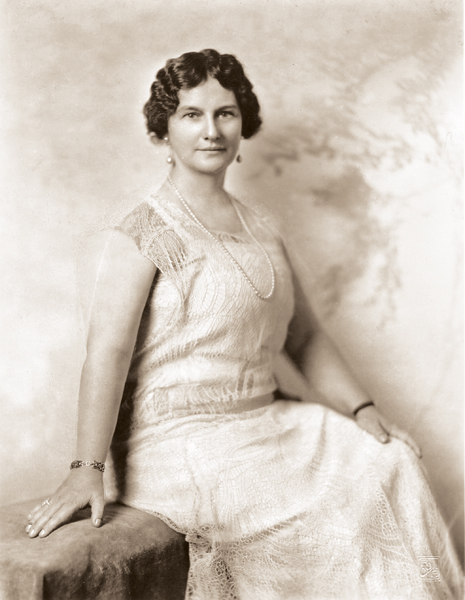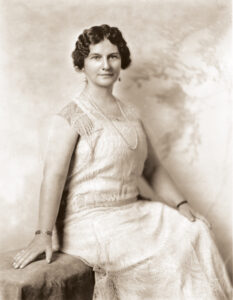Frances Parkinson Keyes
Francis Parkinson Keyes first visited New Orleans during Mardi Gras in 1940 when she was 55 years old. Enthralled with the city, Keyes rented a grand home in the French Quarter and set many novels there, including "Dinner at Antoine's," published in 1948. Keyes died in her home in New Orleans on July 3, 1970.

Courtesy of Beauregard Keyes Collection
Frances Parkinson Keyes. Unidentified
Frances Parkinson Keyes was born in Virginia, grew up in Vermont and Boston, and lived most of her adult life in and around Washington, D.C., but her fiction and historic restorations link her firmly to Louisiana. The author of several best-selling novels, Keyes is perhaps best known for her 1948 murder mystery, Dinner at Antoine’s, which is set in New Orleans. Also famous for her gracious hospitality, Keyes meticulously restored a French Quarter home, now known as the Beauregard-Keyes House, to entertain her many guests. She was an advocate for historic preservation and restoration throughout her life.
Early Life
Born in Charlottesville, Virginia, on July 21, 1885, Frances Parkinson Wheeler was the child of John Henry Wheeler and Louise Fuller Johnson Wheeler. After her father, a professor of Greek, died in 1887, her mother returned to their native New England. Keyes’ education was largely informal, but she acquired considerable linguistic skills as well as a deep appreciation for living in historic homes. When she was eighteen, she married Henry Keyes, a man of forty, who became governor of New Hampshire in 1916 and later served as U.S. senator until shortly before his death in 1938. Frances Keyes spent the early years of her marriage raising their three sons, and despite her husband’s disapproval of her writing ambitions, she managed to publish her first novel, The Old Gray Homestead, in 1919.
In Washington, Keyes became involved in numerous civic projects, including the restoration of Arlington; in 1921, she began writing a popular series for Good Housekeeping, “Letters from a Senator’s Wife,” which ran for fourteen years and included accounts of her extensive world travels. Having published several volumes of fiction and nonfiction, Keyes finally wrote a bestseller, Honor Bright (1936). The next year, she wrote the first of several biographies of religious figures, Written in Heaven: The Life on Earth of the Little Flower of Lisieux (1937), and in 1939, she became a Roman Catholic.
Keyes in Louisiana
Keyes first visited New Orleans during Carnival in 1940, at the invitation of Clarence Bussey Hewes, a diplomat from Jeanerette. She was enthralled by the city, and the novel Crescent Carnival (1942) resulted, followed by a dozen romances set in Louisiana, including her most famous novel and only mystery, Dinner at Antoine’s (1948). The River Road (1945), Steamboat Gothic (1952), and Blue Camellia (1957) were also set in the Pelican State. One notable feature of Keyes’ fiction was the extensive research that she did to immerse herself—and her readers—into an authentic milieu. Often including prefaces and bibliographies to explain her sources, Keye’s attention to detail gave a rich materiality to her fiction, though it sometimes encumbered her plots. Personally aloof and disappointed by her lack of critical success, Keyes was dedicated to her craft and maintained a rigorous writing schedule despite chronic pain; she eventually completed more than fifty novels, biographies, and memoirs.
In 1945, as Keyes was spending more and more time in New Orleans, she rented and later purchased an elegant French Quarter mansion known for an earlier famous tenant, Confederate General P.T. Beauregard. The Beauregard-Keyes House, as it is now known, remains a testimony to Keyes’ dedication to historic preservation in architecture as well as in fiction. She died there on July 3, 1970.
